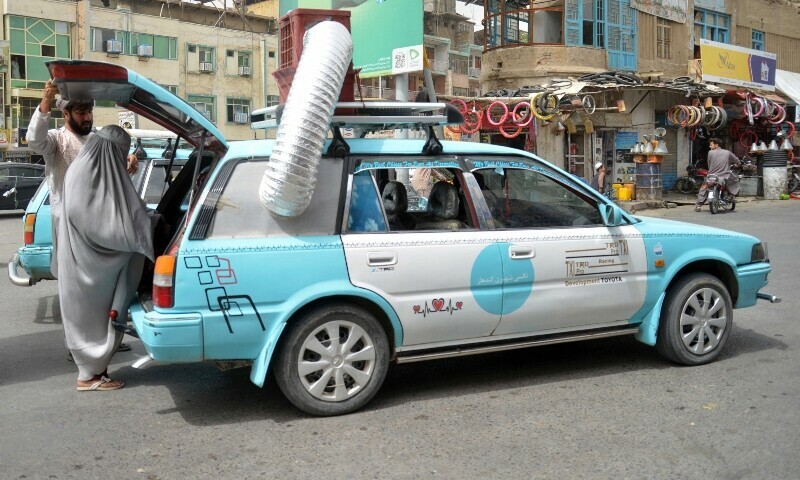In the bustling city of Kandahar, Afghanistan, where the scorching sun beats down relentlessly, a unique sight has captured the attention of both locals and visitors alike. Blue taxis roam the streets, each adorned with a makeshift air conditioning unit perched precariously on the roof, providing much-needed relief from the oppressive heat. This ingenious solution has been crafted by resourceful taxi drivers like Gul Mohammad, who refused to let the sweltering temperatures deter them from their livelihood.
Facing soaring temperatures that often exceed 40 degrees Celsius, the traditional air conditioning systems in these taxis proved inadequate and too costly to repair. Determined to find a practical and affordable solution, Gul Mohammad sought the expertise of a technician who fashioned a custom cooler for his vehicle. “It started getting extremely hot three or four years ago. These cars’ AC systems didn’t work, and repairs were too expensive. So I went to a technician, had a custom cooler made,” shared Gul Mohammad, highlighting the necessity that drove him to innovate.
This makeshift cooler, powered by the taxi’s battery and replenished with water regularly, has garnered praise from fellow drivers like Abdul Bari, who attested to its effectiveness. “This works better than [built-in] AC. ACs only cool the front — this cooler spreads air throughout,” remarked Abdul Bari, emphasizing the practicality and functionality of this unconventional cooling system. In a testament to their ingenuity, some drivers have even connected their devices to solar panels mounted on the taxi’s roof, ensuring a sustainable source of cool air for their passengers.
Amidst this innovative solution lies a deeper narrative of resilience and adaptation in the face of environmental challenges. Afghanistan, ranked among the poorest nations globally, is acutely vulnerable to the impacts of climate change, with heatwaves and droughts becoming increasingly prevalent. The demand for these improvised cooling systems among taxi drivers has surged in recent years, reflecting the urgent need for practical solutions in a country grappling with limited resources.
Murtaza, a young technician catering to the growing demand for these cooling units, highlighted the shift observed in the past few years. “Many cars weren’t equipped with air conditioning anyway, which is why we’re installing these,” explained Murtaza, underscoring the essential role these makeshift coolers play in enhancing the comfort of both drivers and passengers enduring the sweltering heat. The streets of Afghan cities, crowded with aging vehicles repurposed from neighboring countries, bear witness to the resilience and adaptability of its inhabitants in the face of challenging circumstances.
As Norullah, a passenger benefiting from the cool blast of air inside a taxi, aptly expressed, “When there’s no cooler, it becomes very difficult. These drivers are helping solve the problem, and that’s great.” The collaborative efforts of drivers like Gul Mohammad and Abdul Bari not only offer a reprieve from the stifling heat but also symbolize a spirit of innovation and community support in navigating environmental adversities.
In a world where climate change poses increasingly severe challenges, the story of Afghan taxi drivers embracing creative solutions serves as a poignant reminder of human resilience and adaptability. Through their inventive approach to staying cool, these drivers exemplify the power of grassroots innovation in addressing pressing environmental issues. As they navigate the sweltering streets of Kandahar, these blue taxis with their rooftop coolers stand as a testament to the indomitable spirit of individuals finding ways to thrive amidst adversity.

